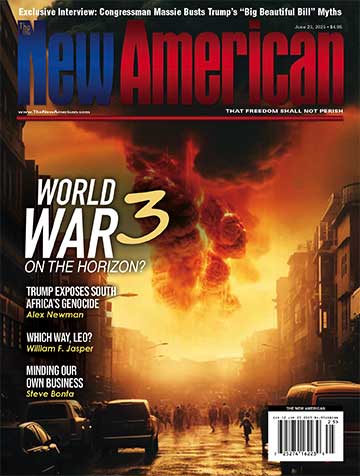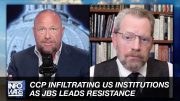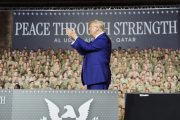
Not that long ago, it was common for the hate-America-first crowd to say that our Mideast military adventures were “all about oil.” Oddly, we never actually saw that oil or benefited from greater black gold supplies until we ramped up our own domestic production. But now some are saying that Vladimir Putin’s invasion of Ukraine is “all about oil” — and this time, the claim may actually be true.
First up is Trump economist and FOX Business host Larry Kudlow, who on Wednesday placed the blame for Moscow’s invasion squarely on the Biden administration’s energy policies. After pointing out that the Russian stock market rose 6.5 percent as soon as Joe Biden announced he was placing sanctions on Russia, he stated:
Mr. Biden, you need to be honest about the damage you’re doing to the American energy industry. In fact, you’ve done everything you can to drive up prices and you know it because you’re dancing to the radical green tune. Your jihad against fossil fuels has held down production in the face of rising demand and that has been a key factor in driving up world oil prices towards $100 a barrel.
In effect, Biden’s jihad against fossil fuels is financing Vladimir Putin’s military adventures because if we were producing at 13 million BPD as we did pre-pandemic … oil prices would be substantially lower and Putin would be significantly poorer.
Mr. Biden’s energy policies have been utterly self-destructive to America and have directly empowered Vladimir Putin and all of Putin’s crazy ahistorical, romanticized, inaccurate vision of history .
History professor and Hoover Institution fellow Victor Davis Hanson made essentially the same case on Tuesday. Appearing on Tucker Carlson Tonight, he claimed that, historically, Putin has become adventuristic whenever he has been flushed with cash due to limited oil production in the United States, citing 2014 (attack on Crimea) and 2008 (invasion of Georgia) as examples.
A perhaps deeper analysis, however, was provided Thursday by former Moscow correspondent Lukas I. Alpert. Writing at MarketWatch, Alpert states that to grasp the Kremlin’s motivations in Ukraine, we must note that Russia provides 40 percent “of Europe’s heating-fuel supplies — namely, natural gas.” He continues:
To get it there, Russia relies mostly on two aging pipeline networks, one of which runs through Belarus and the other through Ukraine. For this, Russia pays Ukraine around $2 billion a year in transit fees.
Russia is a petrostate and relies on oil and natural-gas sales for about 60% of its export revenue and 40% of its total budget expenditures. Any crimp on Russia’s ability to access the European market is a threat to its economic security.
In the Kremlin’s view, a switch of allegiance by Kiev, or Kyiv by Ukrainian preference, to the West — be it an economic association agreement with the European Union like Ukraine was on the verge of signing in 2014, or even the hint of joining NATO — is close to an act of war.
As for Ukraine’s perspective, Alpert writes that its people wanted to enjoy the newfound prosperity of Poland and Latvia, which coincided with those nations’ joining of NATO and the European Union. Ukrainians figure that they, too, may get a piece of the prosperity pie with membership in those entities.
“This is where Putin’s nationalistic impulses kick in,” Alpert then writes. “He views the fall of the Soviet Union as the ‘greatest geopolitical tragedy’ of the past century and the rush of former Eastern bloc countries into the embrace of the European Union, and even NATO, as a great humiliation.”
“He has drawn a line in the sand with countries that border Russia, invading Georgia in 2008 when it hinted at joining NATO, and moving to destabilize Ukraine when it moved to establish closer economic ties with Europe,” Alpert further states.
Alpert buttresses his case by pointing out that Russia invaded “Georgia in 2008 when it hinted at joining NATO” and sought “to destabilize Ukraine when it moved to establish closer economic ties with Europe.”
We don’t know what an alternate future, in which the U.S. had promised the Kremlin that Ukrainian NATO membership was a non-starter, would have been. Maybe Putin would’ve eventually moved against Ukraine, anyway.
What does seem clear is that provoking the Bear with such a prospect was unwise policy. How would China have reacted if we’d recently proposed absorbing Taiwan into NATO? (Yes, I realize NATO is focused on the North Atlantic region and on countering Russia, but I’m just making a point.) In fact, we terminated our Mutual Defense Treaty with Taiwan in 1980 and now have only unofficial relations with the country.
The reality is that you must tread softly when at another great power’s doorstep. We certainly wouldn’t appreciate it if Russia or China forged a mutual-defense alliance with Cuba. In fact, it was Soviet meddling in that nation — in particular, the matter of deploying nuclear weapons on its shores — that sparked the Cuban Missile Crisis in 1962.
President John F. Kennedy took a hard line at the time; the United States couldn’t back down because allowing another power to set up shop at our doorstep was dangerous and an unacceptable loss of face. It’s the same with China and Taiwan — and Putin and Ukraine.
Putin is a thug. So is Xi Jinping and so many other world leaders. But they’re smart thugs, and they won’t be bested with stupid foreign policy.




